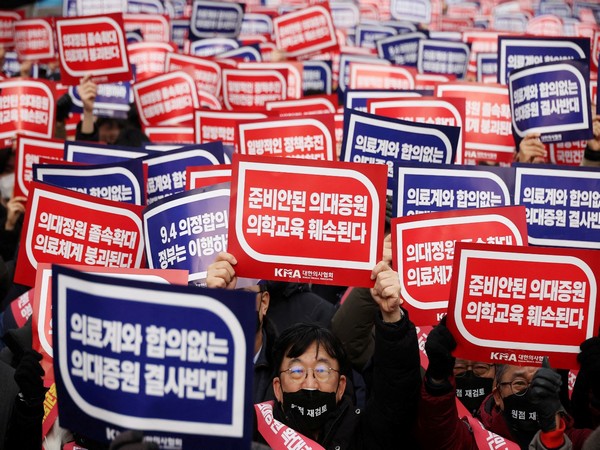South Korea’s health ministry said on Monday it has sent preliminary licence suspension notices to about 5,000 trainee doctors who have defied orders to return to work in protest against a plan to increase the number of medical students.
Deputy Health Minister Jun Byung-wang told reporters that the distribution of notices to 4,944 junior doctors was finalised last week. After receiving the notification, the doctors will have until 25 March to submit their opinions on the punitive measures.
Jun said the government has promised to take legal action against junior doctors who threaten their colleagues or prevent them from returning to hospitals, so the ministry has set up a hotline to protect doctors who want to return. He claimed:
The government will spare no efforts to help trainee doctors wishing to return to hospitals.
As of Friday, 11,994 trainee doctors at 100 teaching hospitals had left their jobs, accounting for about 93 per cent of all junior doctors, according to the ministry.
Health Minister Cho Kyoo-hong said the government will take lenient measures if trainee doctors return to work before administrative procedures to suspend their licences are completed. Cho told a KBS radio:
As we plan to proactively extend leniency to junior doctors who return before the conclusion of administrative procedures, we encourage their prompt comeback.
Surgeries and emergency medical care at local hospitals have been cancelled and delayed as interns and residents continue to protest in response to the government’s call for a return to the end of February.
To make up for the shortage of medical personnel, the government on Monday began sending 158 military and government doctors to local hospitals for a four-week period. Last week, the health ministry also authorised nurses to perform some of the functions of doctors, including CPR. Cho said:
When necessary, the government plans to deploy more military and public health doctors, along with more state health insurance funds.
The government is pushing for more doctors to address the shortage of doctors in rural areas and critical areas of medicine, such as paediatrics and neurosurgery, as well as the over-aging population.
The doctors argue that increasing quotas will increase medical costs for patients and undermine the quality of medical education and other services. They are calling for measures to address the problem of specialist underpayment in the first instance and to improve legal protection against excessive medical malpractice lawsuits.
